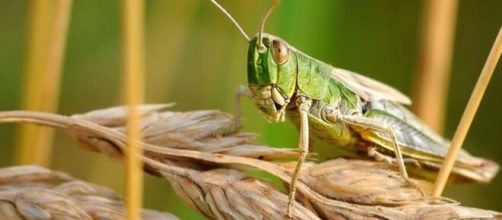A cyclone is believed to be the root cause of locust invasion in the deserts of the Arabian Gulf with possibilities of food shortage. It was Cyclone Mekunu which struck in 2018. Keith Cressman, an expert of FAO, explains that the cyclone gave rise to conditions favorable for vegetation to thrive in the desert regions. That gradually turned into a breeding ground for the crop-devouring swarms of locusts. They took over large stretches of land in the region. It included Yemen where the civil war destroyed the infrastructure necessary to control locust populations.
The crisis is assuming large proportions and it poses danger to potentially millions of people. Their survival would be at stake because locusts are voracious eaters and can lay bare the fields in no time.
Locust crisis poses a danger to millions, forecasters warn https://t.co/EexiuW5Eyi
— Guardian Environment (@guardianeco) March 20, 2020
The Guardian quotes Keith Cressman as saying, "Usually a cyclone brings favorable conditions for about six months and then the habitat dries out.” However, in this case, incidents of cyclones in the area are on the rise. As a result, the locust swarms will flourish and become more common sights. FAO foresees large-scale food scarcity in days to come. It estimates the locust invasion could affect 25 million people.
In the opinion of experts, the ongoing crisis is the worst in decades. It is possible that the pests could remain active for a longer time.
Locusts responsible for food shortage
FAO wants funds to organize its program to tackle the menace of locusts. It predicts a not-too-happy picture. It wants to arrest breeding of the locusts at the earliest date or else the situation could go out of control since their numbers could grow exponentially and spread to other locations.
Cressman adds that Yemen is a key factor. Locusts are common sights there. There used to be an effective locust program in place in the country but the conflict between the government and Houthi rebels has led to complications. Earlier, the setup had access to all parts of Yemen. That advantage is lost.
Editorial: For the past several months, swarms of the desert locust Schistocerca gregaria — some swarms the size of cities — have devoured crops in East Africa, the Middle East and south Asia. Some 20 million people are facing a food crisis. https://t.co/L4tQDebwvi
— Nature (@nature) March 17, 2020
The Guardian describes the effect of cyclones on the movement of locusts.
By late 2019, the pests had entered the Horn of africa when a cyclone struck Somalia in December. That allowed them to occupy new areas. It seems earlier attacks were short-lived but that might extend. There was locust menace in the late 1940s and 50s. In those days, cyclones were rare in the Arabian Gulf but are unpredictable today because of the factor of Climate change. Hence, those in command have to evolve new strategies in order to tackle the threat.
Food shortage a serious concern
According to the Times of Israel, a plague of locusts could strike Africa and the Middle East. It would be the worst such case in more than three decades. Keith Cressman is an official of FAO and an expert on desert locust invasions.
He interprets these as “extremely alarming” swarms that are forming in the Horn of Africa. The Desert Locust is labeled as the “most destructive migratory pest in the world” by the Locust Watch website. They consume their own weight on a daily basis and usually target food crops. When millions of them appear on the scene, the crops disappear. The crisis would affect countries in Africa who could face food shortages. It could become a threat to not only food security but also to the livelihoods of people, especially at the beginning of the upcoming cropping season. Incidentally, food shortage can also be a fallout of climate change when it leads to droughts.
Locust attack means food shortage in Africa
Parts of Africa face the issues of locust invasions. The pests are eating the crops and creating food shortages. They are breeding fast, thanks to cyclones in the area. The authorities are trying to come to terms with the situation and eliminate them because these locusts threaten some African countries. Their invasion could result in a food shortage for millions.


